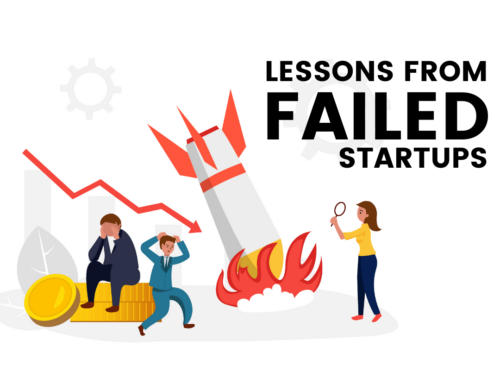Fail often so you can succeed sooner.”
– Tom Kelley

It seemed like three minutes after I hit publish on my interview with entrepreneur Nick Barron, he announced that he was shuttering Flypt.
I’ve been there. I founded three companies which didn’t succeed before co-founding the one which did. I’m sure that the people who went in with me on the other ventures wished that those had been the ones which succeeded, but oftentimes you get good ideas that for whatever reason don’t work out.
What Can We Learn From Failed Startups?

As long as we have some level of introspection and don’t let Monkey Brain take over the post mortem, then we can learn from our failures and be more prepared the next time.
Note: when Monkey Brain says that there was no way you could have failed because you are brilliant, you’re falling victim to the Dunning-Kruger Effect, which is a cognitive bias where ordinary people believe that they’re extraordinary. Everyone in Lake Woebegone suffers from this because they’re all above-average looking.
- Take a hard look at the mirror to see what you could have done better. This isn’t a beat yourself up session. It’s a critical session to identify what you did and where your mistakes were. Nobody has ever done a startup perfectly. Even Mark Zuckerberg. We all have something to learn. Nick has already begun the self-evaluation process and will come out stronger and wiser for the experience.
- Don’t go broke trying. Here, Nick was very wise. He knew that the statistics were not on his side, so he didn’t go all-in trying to finance the company from the onset. He kept his existing job and he and his life partner worked out a budget which Nick could use to determine the viability of the business.
- Know when to fold ’em. Rather than sending good money after bad, Nick and his co-founder made the decision to shutter the business. As Nick said, they couldn’t get enough traction using the limited resources that they had, and, implicitly, the risk was too great to make the full-time leap to try to make it work out.
- Exit gracefully. I’ve seen instances where businesses shut their doors and didn’t tell a soul about it, leaving customers and employees to wonder what was going on when the doors were bolted or the website was suddenly down. By taking a stand-up approach to the ending, Nick left on good terms with the Flypt users and didn’t destroy that goodwill he might have built up with them.
- Strong salespeople help. I always thought of sales as a dirty, white-shoed use car hawker profession. The reality is that you have to market your ideas. I can only imagine what sort of great inventions and ideas never saw the light of day because the creator couldn’t tell enough people about it in a convincing enough manner. Good salespeople are worth their weight in gold and can buy a lot runway for the operations and development teams to get things in place.
- Keep the idea machine flowing. Perhaps in a different time and under different circumstances, Flypt would have worked. It may have been a good idea. It certainly sounded like a good idea. Creativity is something which, as James Altucher points out, can be practiced and grown over time.
In the Revolutionary War, George Washington was a master of the strategic retreat. He was willing to cede ground to the British Army to ensure that the Continental Army remained a viable force in the field. As an entrepreneur, particularly one who chooses to go the bootstrap route, it’s important that you keep your army (e.g. your ability to continue to found companies) viable and in the field. Just because you lose one battle and one of your ideas doesn’t work out doesn’t necessarily mean that you’re not cut out to be an entrepreneur. It may, but it’s not a sure-fire death knell to your entrepreneurial career as long as you both enter and exit the market wisely.
One way that we used to determine that potential exit point was to set milestones for progress, or, as was sometimes the case, lack of regression. For example, at the last company, we made a decision to stop what we were doing if we ever going to the point where we couldn’t wind down and pay two months worth of wages. It’s important to know where your business cash flows are at all times so that you don’t suddenly one day find yourself with no money, a ton of bills, and an incredible urge to dip into the credit cards to pay for everything on the hopes that better days are around the corner. That includes sales and expense forecasting and an honest assessment of what the market is telling you.
Nick will be back one day, and I suspect the next venture will benefit from his experiences with Flypt.
Have you been a part of a failed startup? What were your experiences? Tell us about it in the comments below!
Author Profile
- John Davis is a nationally recognized expert on credit reporting, credit scoring, and identity theft. He has written four books about his expertise in the field and has been featured extensively in numerous media outlets such as The Wall Street Journal, The Washington Post, CNN, CBS News, CNBC, Fox Business, and many more. With over 20 years of experience helping consumers understand their credit and identity protection rights, John is passionate about empowering people to take control of their finances. He works with financial institutions to develop consumer-friendly policies that promote financial literacy and responsible borrowing habits.
Latest entries
 Low Income GrantsSeptember 25, 2023How to Get a Free Government Phone: A Step-by-Step Guide
Low Income GrantsSeptember 25, 2023How to Get a Free Government Phone: A Step-by-Step Guide Low Income GrantsSeptember 25, 2023Dental Charities That Help With Dental Costs
Low Income GrantsSeptember 25, 2023Dental Charities That Help With Dental Costs Low Income GrantsSeptember 25, 2023Low-Cost Hearing Aids for Seniors: A Comprehensive Guide
Low Income GrantsSeptember 25, 2023Low-Cost Hearing Aids for Seniors: A Comprehensive Guide Low Income GrantsSeptember 25, 2023Second Chance Apartments that Accept Evictions: A Comprehensive Guide
Low Income GrantsSeptember 25, 2023Second Chance Apartments that Accept Evictions: A Comprehensive Guide

